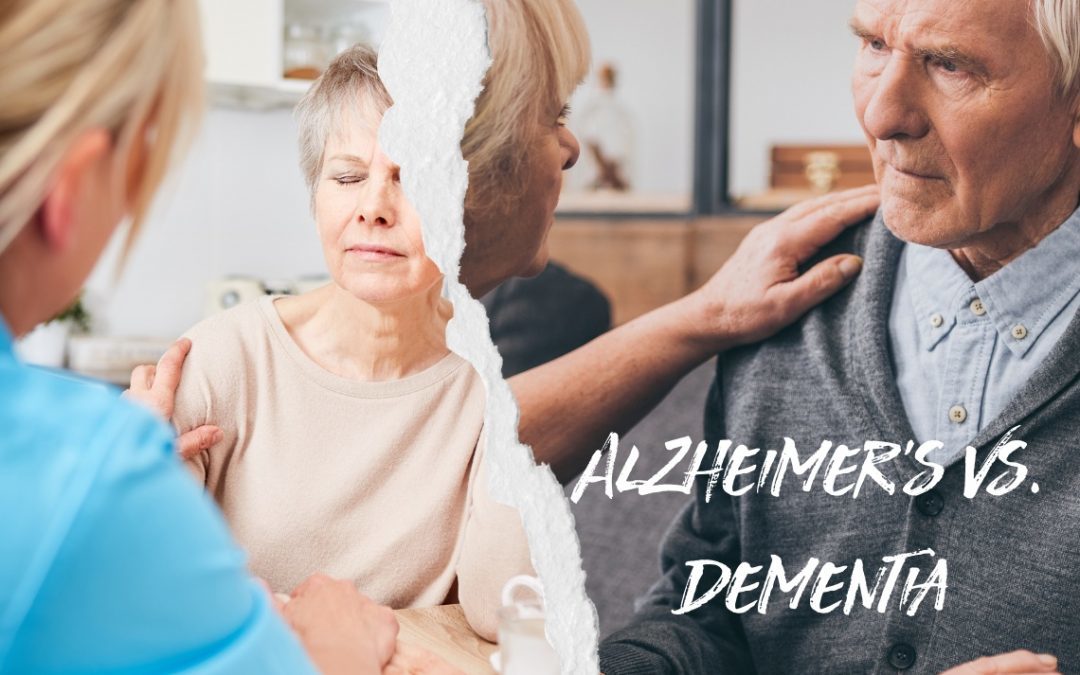Understanding the terms Dementia and Alzheimer’s
Many use these terms interchangeably. However, these two conditions aren’t the same. Did you know that Alzheimer’s is a type of dementia? Alzheimer’s disease gets worse with time and affects memory, language, and thought..
While younger people can develop dementia or Alzheimer’s disease, your risk increases as you age. Still, neither is considered a normal part of aging. Although symptoms of the two conditions may overlap, distinguishing them is important for management and treatment.
What is dementia?
Dementia is a syndrome, not a disease. A syndrome is a group of symptoms that doesn’t have a definitive diagnosis. Dementia is a collection of symptoms that affects mental cognitive tasks such as memory and reasoning. Dementia is an umbrella term that Alzheimer’s disease can fall under. It can occur due to a variety of conditions, the most common of which is Alzheimer’s disease.
People can have more than one type of dementia. This is known as mixed dementia. Often, people with mixed dementia have multiple conditions that may contribute to dementia. A diagnosis of mixed dementia can only be confirmed in an autopsy.
As dementia progresses, it can have a huge impact on the ability to function independently. It’s a major cause of disability for older adults, and places an emotional and financial burden on families and caregivers.
Symptoms of dementia
The early symptoms of dementia are mild and it often starts with simple episodes of forgetfulness where as, people with dementia have trouble keeping track of time and tend to lose their way in familiar settings.
Forgetfulness and confusion grows as dementia progresses. Many find it It harder to recall names and faces. Obviously, taking personal care becomes a problem. Obvious signs of dementia include repetitious questioning, inadequate hygiene, and poor decision-making.
In the most advanced stage, people with dementia become unable to care for themselves. With time, the behavior continues to change and can turn into depression and aggression.
What are the causes of dementia?
As you age, you are more likely to develop dementia. The brain cells are damaged and many conditions can cause dementia including other diseases as Alzheimer’s, Parkinson’s and Huntington’s. Each cause of dementia causes damage to a different set of brain cells. Alzheimer’s disease is responsible for about 50 to 70 percent of all cases of dementia.
Alzheimer’s disease
Dementia is the term applied to a group of symptoms that negatively impact memory, but Alzheimer’s is a progressive disease of the brain that slowly causes impairment in memory and cognitive function. The exact cause is unknown.
More than 5 million people in the United States have Alzheimer’s disease. Although younger people can and do get Alzheimer’s, the symptoms generally begin after age 60.
The time from diagnosis to death can be as little as three years in people over 80 years old. However, it can be much longer for younger people.
Alzheimer’s on the brain
Damage to the brain begins years before symptoms appear. Abnormal protein deposits form plagues and tangles in the brain of someone with Alzheimer’s disease. Connections between cells are lost, and they begin to die. In advanced cases, the brain shows significant shrinkage.
It’s impossible to diagnose Alzheimer’s with complete accuracy while a person is alive. The diagnosis can only be confirmed when the brain is examined under a microscope during an autopsy. However, specialists are able to make the correct diagnosis up to 90 percent of the time.
What are some similarities between Alzheimer’s and Dementia?
Both conditions can cause:
- a decline in the ability to think
- memory impairment
- communication impairment
The symptoms of Alzheimer’s include:
- difficulty remembering recent events or conversations
- apathy
- depression
- impaired judgment
- disorientation
- confusion
- behavioral changes
- difficulty swallowing, or walking in advanced stages of the disease
Are treatments available to help someone with dementia or cognitive decline?
Yes. If you or a loved one is experiencing difficulties with memory, attention, communication, reasoning or judgement, and feeling depressed or not themselves, neurofeedback training can help improve their symptoms. Neurofeedback training relies on the neuroplasticity of the brain and its amazing ability to learn and rewire itself to compensate for areas that have been damaged by disease or injury. One study of Alzheimer’s patients who received neurofeedback training showed improvements in memory, recall, and recognition.
Learn More About Neurofeedback
If you or a loved one is having difficulties with their memory, has symptoms of dementia, or is in the earlier stages of an Alzheimer’s diagnosis, neurofeedback training may help improve their functioning. Neurofeedback is non-invasive and painless and involves re-training your brain to function more optimally. Explore neurofeedback as a possible non-drug solution which might make a difference.
Learn more about what makes Saving Your Brain unique and what patients have to say about the amazing brain retraining programs available.

